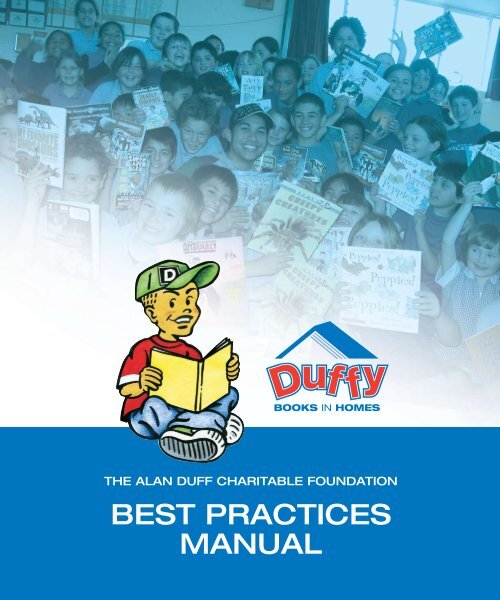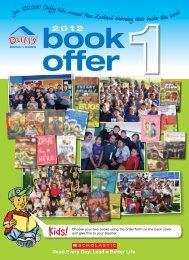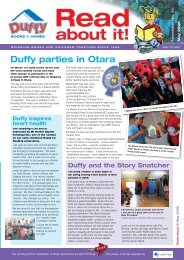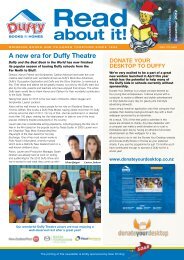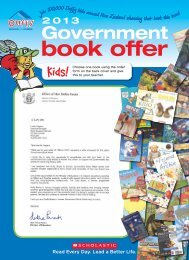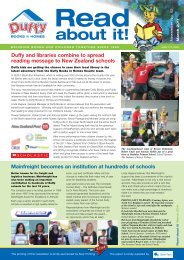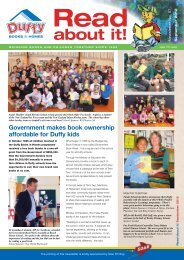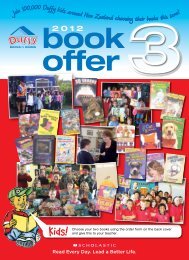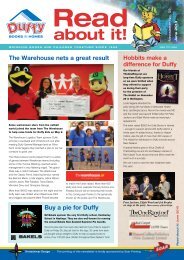Download - Duffy Books In Homes
Download - Duffy Books In Homes
Download - Duffy Books In Homes
- No tags were found...
You also want an ePaper? Increase the reach of your titles
YUMPU automatically turns print PDFs into web optimized ePapers that Google loves.
TABLE OF CONTENTSINTRODUCTIONKey Contact Details<strong>Duffy</strong> Coordinator- Who can be the <strong>Duffy</strong> Coordinator?- Tips for getting startedSECTION 1 - Programme DetailsBook Offers (Offers One and Three)- How they work- The preview pack- Brochures- Preview books- <strong>In</strong>structions- Placing your order- Ideas for processing your book orders- Receiving your book orders- Book labels- IdeasRole Model Assemblies- Notifications- Role Models- Procedure/suggested format- Ideas- Templates- <strong>In</strong>vitations- Thank you card- Hat- Bookmarks
TABLE OF CONTENTS continuedSECTION 1 continuedGovernment Book Week (Book Offer Two)- IdeasCaught Being Good- How it works- Ideas for running CBGKids at Home- How it works- How to run KaH in your school- Ideas- TemplatesOther Awards and <strong>In</strong>itiatives- Caught Being a Good Mum, Dad and Grandparent- New Zealand Post Award for Great Effort in Reading and Writing- School Leader Assembly- High School speaker information sheet- Ideas- <strong>Duffy</strong> Theatre- <strong>Duffy</strong> Song- Schools and Sponsors Get in Touch Week- Mainfreight Award for Excellence in Attitude- $5 Parent OfferSECTION 2 - Extra Ideas and <strong>In</strong>formationHistory LessonSponsorsFree space to insert your own ideas
INTRODUCTIONINTRODUCTION
INTRODUCTIONBelonging to the <strong>Duffy</strong> <strong>Books</strong> in <strong>Homes</strong> programme provides you with a tool toenhance existing literacy programmes in your school.VisionTo inspire a love of books in <strong>Duffy</strong> children so they becomeadults who inspire a love of readingMissionWe will achieve our vision by:• creating and enhancing the desire for children to read through bookownership• reaching out to an ever-widening range of children and communities• developing our programmes to meet the specific needs and aspirationsof our diverse communities• developing an interlinked network of people and organisations tocollaborate on how to best meet the needs of our students and theircommunities• constantly focusing on our vision and valuesAccomplishmentWe will know we have achieved this when <strong>Duffy</strong> <strong>Books</strong> in <strong>Homes</strong>:• is a recognised partner for literacy initiatives throughout low decile schools inNew Zealand• has made a measurable difference in communities, families and schoolsthrough our workValuesUnderpinning our vision and mission are our shared values which will lead us toachieve our goals:Team Work Fun Communication PassionLeadership Commitment <strong>In</strong>novationApril, 2008
• Our objective is to provide the opportunity for children to choose and receive newbooks to take home and keep, inspiring a lifelong love of reading.• We are investing in our country’s most important asset – our children• We are promoting the importance of literacy within families and the community• It is a partnership between <strong>Duffy</strong> <strong>Books</strong> in <strong>Homes</strong>, schools, sponsors, children andcommunities.“The poor and the affluent are not communicating because they do not have the same words.When we talk of the millions who are culturally deprived, we refer not to those who do nothave access to good libraries and bookstores, or to museums and centres for the performingarts, but those deprived of the words with which everything else is built, the words that opendoors. Children without words are licked before they start. The legion of the young wordless inurban and rural slums, eight to ten years old, do not know the meaning of hundreds of wordswhich most middle-class people assume to be familiar to much younger children. Most of themhave never seen their parents read a book or a magazine, or hear words used in other thanrudimentary ways related to physical needs and functions. Thus is cultural fallout caused, thevicious circle of ignorance and poverty reinforced and perpetuated. Children deprived of wordsbecome school dropouts, dropouts deprived of hope behave delinquently. Amateur censorsblame delinquency on reading immoral books and magazines, when in fact, the inability to readanything is the basic trouble.”- Peter S. Jennison (American historian, novelist and publisher)Being part of the <strong>Duffy</strong> <strong>Books</strong> in <strong>Homes</strong> programme enables each child in yourschool to receive a guaranteed five books each year. These books come toyour school in three book offers in Terms One, Two and Three. <strong>In</strong> Book OffersOne and Three, students receive two books for each offer. Book Offer Two issponsored by the Government and students receive one book. There are manyother aspects of the programme designed to encourage and reward literacy andreading in your students.April, 2008
KEY CONTACTDETAILSKEY CONTACTDETAILS
Key Contact Details<strong>Duffy</strong> <strong>Books</strong> in <strong>Homes</strong>Freephone: 0800 383 392Phone: 09 259 5690Fax: 09 270 7416Postal: PO Box 28849, Remuera, AucklandPhysical: 2 Railway Lane, Otahuhu, AucklandWebsite: www.booksinhomes.org.nzEmail: duffy@booksinhomes.org.nzScholasticFreephone: 0800 724 652Fax: 09 274 8115Postal: Private Bag 94407, Greenmount, AucklandPhysical: 21 Lady Ruby Drive, East Tamaki, AucklandWebsite: www.scholastic.co.nzApril, 2008
DUFFYCOORDINATORDUFFYCOORDINATOR
Who can be the <strong>Duffy</strong> Coordinator?The <strong>Duffy</strong> Coordinator can be anyone: a teacher, the principal, the librarian, theoffice administrator, a mum or dad, or even a member of the community that wants tohelp out. It is important to remember that the job of being the <strong>Duffy</strong> Coordinator canbe time-consuming and in order to make the programme work successfully in yourschool, the <strong>Duffy</strong> Coordinator needs to be committed to the programme.You may wish to split up the role and appoint a coordinator to look after the main partof the programme and another coordinator to look after the Kids at Home programme(KaH) – the preschool programme which provides books to siblings of children at<strong>Duffy</strong> schools.What does being the <strong>Duffy</strong> Coordinator involve?Being the <strong>Duffy</strong> Coordinator involves coordinating the programme in your school.You are responsible for:• processing your school’s book orders and making sure they are in on time• processing the book orders when they arrive back in your school• preparing and organising for your Role Model Assemblies• being the point of contact in your school for <strong>Duffy</strong> <strong>Books</strong> in <strong>Homes</strong>• organising key <strong>Duffy</strong> awards and events• keeping in touch with your sponsor• coordinating Caught Being Good awards for students and caregivers• coordinating the Kids at Home programme• making sure that parents and the community are aware of the programmeHow will this manual help?This ‘Best Practices’ manual has been designed especially to make the <strong>Duffy</strong>Coordinator’s job easier. Please take the time to read it thoroughly and feel free toadd to it. Many of the ideas have come from other schools on the programme. Thereare lots of templates for you to make use of and there are areas throughout thebook to file additional information. Please note that over time certain aspects of theprogramme may change. If this happens you may be sent replacement or additionalpages to add to your folder from time to time.The manual is divided into two sections.The first section summarises each aspect of the programme, how each aspect worksand ideas and suggestions for running each one.The second section of this manual contains sections with ideas to help you improvethe programme in your school. You can add your own ideas to this section and use itas a ready reference for the programme.April, 2008
Our research has shown that the <strong>Duffy</strong> Coordinator and Principal are key tothe programme’s success in a school. We provide you with all the tools, so nowit’s up to you! Remember, support and help is always just a phone call away:call us free on 0800 383 392 and a friendly member of the <strong>Duffy</strong> <strong>Books</strong> in<strong>Homes</strong> team will help you out.April, 2008
Tips for Getting Started:• The <strong>Duffy</strong> Year Planner has all the relevant <strong>Duffy</strong> events and dates you need tobe aware of. Make sure you have copies of the <strong>Duffy</strong> Year Planner in your officespace, the school staff room, the principal’s office and in the school reception and/or foyer. You will receive four copies of this at the end of each school year for theupcoming year.- Transfer the dates from the <strong>Duffy</strong> Year Planner onto your School Calendar sothat all staff members have access to it.- You may wish to transfer key dates into your own personal diary.• Keep a <strong>Duffy</strong> in-tray in the school office near the fax machine. All <strong>Duffy</strong> faxes areclearly marked to the attention of the <strong>Duffy</strong> Coordinator or Principal. All letters/postwill be addressed to the <strong>Duffy</strong> Coordinator or Principal.• Please ensure that all staff members are aware that you are the <strong>Duffy</strong> Coordinatorand know to give you any DBiH information or material that arrives in your school.As coordinator it is important that you take delivery of any DBiH goods and arekept up to date with all current information.• Make sure that the <strong>Duffy</strong> <strong>Books</strong> in <strong>Homes</strong> office has your correct email addresson file as you will often receive correspondence by email.• Please remember to update your sponsor’s contact details as you receive them.• You will receive a Term Reminder fax and/or email from <strong>Duffy</strong> <strong>Books</strong> in <strong>Homes</strong> atthe start of each term. Be sure to check this as sometimes they contain changesand amendments to the Year Planner schedule.• Keep a close eye on when you should expect deliveries of preview packs, KaHdistributions, book offer books, award books, sticky labels and Caught Being Goodcertificates. If you do not receive them by the advised date contact us immediatelyand we can perform a track and trace with our courier.• Refer to the website – www.booksinhomes.org.nz• If you have any problems or questions just give us a call.On behalf of the <strong>Duffy</strong> <strong>Books</strong> in <strong>Homes</strong> team, thank you for taking on theresponsibility of coordinating the <strong>Duffy</strong> <strong>Books</strong> in <strong>Homes</strong> programme in yourschool. You are investing in your children’s futures and we thank you for givingup your time and energy to provide such a valuable service to your students.We appreciate you and all your hard work – salute yourself!April, 2008
BOOKOFFERSBOOK OFFERS
How They Work:• There are three Book Offers a year held in Terms One, Two and Three.• Book Offer One (Term One) students receive two new books of their choice to takehome and keep• Book Offer Two (Term Two) students receive one book of their choice that is fullysponsored by the Government• Book Offer Three (Term Three) students receive two further books of their choice totake home and keepThe Preview PackOn the first or second day of Terms One, Two and Three you will receive a boxfrom our book supplier, Scholastic NZ. This box is clearly marked and containsyour preview pack.Each preview pack contains:• brochures with details of each of the books on offer and a form on the backpage where children can make their choices.• a preview copy of each of the books in the brochure*• ordering instructions• master order forms• a prepaid envelope for returning your orders to Scholastic• sticky book labels to go inside the preview books recognising Scholastic fortheir donation of these books to your school.*see preview pack notes on next page.BrochuresThe pages of the brochure are divided by colour into age groups.• books suitable for ages 5 - 6• books suitable for ages 7 - 8• books suitable for ages 9 - 10• books suitable for ages 11 +• Te Reo Maori titlesThis is a general guideline but remember that children can select any booksthey wish from the brochure.April, 2008
Preview <strong>Books</strong>The preview books are a copy of each of the books in the book brochure for thatparticular offer. They are provided to you to help the children make their decisionon which book(s) they would like to receive.Depending on the year levels and numbers of children in your school, you willreceive a copy of most of the books in the brochure. For example, a primaryschool with children between Years 1-6 will not receive the older level books.However, the children are welcome to order these books.Also, only new Te Reo Maori titles that have not been in previous preview packswill be included.Once the children have made their selections and you have posted in yourorder, the preview pack is the school’s to keep. This is a donation fromScholastic for your school. Please attach the enclosed sticky book labels to thebooks to recognise Scholastic’s donation to your school.Make sure you always take a photocopy of your orders so when the booksarrive you can match up the orders to your students.Ideas on how to use the preview pack books once you have ordered:• Use the preview books for late-starters or new-comers who miss outon ordering at the start of term.• Put the preview books into your library.• Use the preview books to supplement your Caught Being Good bookselection.• Create a new award or have a competition and use these books asprizes – e.g. you might want to hold a Book Week leading up to yourRole Model Assemblies. You could use these books as prizes for ‘BestDressed’ or ‘Best Book Report’.• Use the books as an award for the first class to get their orders in.April, 2008
Book Offer <strong>In</strong>structions• Photocopy the Class Order Form and give one to each teacher.• Distribute a book brochure to each child.• Display the preview pack books in your library. Each class should spend atleast one library period looking at the books to help the students decide whichbooks they would like to order. <strong>Books</strong> are graded by colour according to agegroups but children may choose any book from the brochure.• <strong>Books</strong> suitable for ages 5 - 6• <strong>Books</strong> suitable for ages 7 - 8• <strong>Books</strong> suitable for ages 9 - 10• <strong>Books</strong> suitable for ages 11+• Te Reo Maori titles• The preview pack books are sponsored by Scholastic New Zealand Ltd.The books are donated to your school once students have made their selections.Please note that these books can also be used for new arrivals that miss out onordering at the start of term or to supplement your CBG selection.• Students must select FOUR books each (Three for Book Offer Two), in orderof preference and fill out the Student Order Form on the back of the brochure.99% of students receive their first choice book(s).• ONLY current students may order books.• Teachers then collate student orders onto the Class Order Form. Please enterthe code numbers of the four chosen books next to the names of the students.• Photocopy all the Class Order Forms and keep a copy. You will need this todistribute the books, as Scholastic’s packing slip identifies students by code,not name.• Attach a copy of all Class Order Forms to the School Cover Sheet.• Check all details are filled in clearly, written IN PEN and are correct beforesending.• Place in the prepaid envelope provided and POST to Scholastic New Zealand Ltd.The closing date for each offer is in your <strong>Duffy</strong> Year Planner. Remember, if youreturn your order by the early return deadline you will receive TWO FREE BOOKSfor your library.April, 2008
Placing Your Order- For Book Offers One and Three each child needs to select four books in casetheir first two choices are not available.- For Book Offer Two each child needs to select three titles in case their firstchoice is not availableThe turn-around for getting the orders back to Scholastic is normally twoweeks, so you don’t have much time. The reason for the short time frame is to helpensure that the children get the books they order.Once your order is sent to Scholastic a whole frame of action is set in motion. Firstlyevery child’s order is data-captured. Scholastic then forecast the quantities they willneed of every book. The next job is to source the extra books needed from countriesaround the world such as the USA, Canada, the UK, and Australia, and organise toairfreight the books in. Sometimes if a book is extremely popular Scholastic will needto re-print it for the <strong>Duffy</strong> <strong>Books</strong> in <strong>Homes</strong> programme - a process which takes placeoverseas, with the books air-freighted back to New Zealand.Timing is critical – from the day your school receives the preview pack to when thechildren receive the books they ordered. Scholastic’s aim is to make sure that <strong>Duffy</strong><strong>Books</strong> in <strong>Homes</strong> kids get the book choices they want. 99% of children receive theirfirst and second choice of book.You should receive your preview packs on the first or second day of TermsOne, Two and Three. Generally you have about ten working days to get your BookOrders back to Scholastic. If you get the orders back early, Scholastic rewardsschools with TWO FREE BOOKS for the school library. Refer to your <strong>Duffy</strong> YearPlanner for the exact dates.You need to ensure that each child makes a selection. Record these selections on theclass forms that you will receive in the preview pack, take a copy of the selections foryour own records and then POST the orders to Scholastic in the pre-paid envelopethat is in the preview pack. If you lose the envelope please do not fax your orders, youcan post them to:Scholastic NZ LtdFreepost 1504Private Bag 94407GreenmountAucklandApril, 2008
Ideas for processing your book orders:• Photocopy the class order form and get class teachers to be responsible forgetting their class orders in. You could make it into a competition with the firstclass to get all their orders back to the <strong>Duffy</strong> Coordinator winning a prize.• Make the first week of term ‘Library Week’. Set up the books in the previewpack on a display in the library and set aside an hour or so to go througheach book with each class and help them decide which books to choose.• Create book boards for each reading level. Cut the pictures of the books outof the brochures and stick them onto a big piece of coloured paper– one foreach reading level. Great for younger kids.• Read excerpts from each book at assembly or in class.• For younger students using the brochure, get students to circle their firstchoice, put a square round their second choice and a triangle round theirthird choice. Another option is to use different coloured stickers etc.• Set up a display in the library of the books in the preview pack. You might liketo create a ‘<strong>Duffy</strong> <strong>Books</strong>helf’. During each class library time get the studentsto choose which books they would like, assisted by the librarian or teachers.Get the teacher to fill in the class order at the end of the session.• Some coordinators check the orders to ensure that no single family gets twobooks the same. However, remember that it is ultimately the child’s choice.• Take time to talk to students about each book - don’t rush the selectionprocess.• Nominate a child to be <strong>Duffy</strong> for a week. Make a special <strong>Duffy</strong> t-shirt andhave the child responsible for delivering the preview box to each classroomand collecting the order sheets.• If you are a smaller school and have the time, one on one time to helpchildren select books is really beneficial.• Big School? Split up the preview pack for Juniors and Seniors so you cancirculate them separately.• One school forms a circle in a class and passes each book from child to child.April, 2008
Receiving Book OrdersOnce you have placed your book order with Scholastic, sit back and breathe a sigh ofrelief! Your books will arrive four to five weeks after you place your school’s order.The books will arrive in class lots. The big job now is to match up children with theirbook choices using your photocopied book orders and attach a sticky label to eachchild’s book.Please hold onto the books until your Role Model Assembly for distribution.Book LabelsFor <strong>Books</strong> Offers One and Three you will receive sticky book labels around thesecond or third week of terms One and Three. These labels go on the inside coverof all the books. These labels recognise your school and your sponsor and leave aspace for the child’s name to be written in.Please note that these sticky book labels are for use in your CBG <strong>Books</strong> as well. Alsoarriving with your stickers will be the Caught Being Good Certificates. These are sentdirectly to your school from our printer. This is a small parcel so please keep it in asafe place.Sticky labels for Book Offer Two (the Government Book Offer) will arrive in Term Twowith your preview pack or with the book orders, (see the start of Term Two Fax/Emailfor details.) These stickers recognise the Government for sponsoring the book offer.Sometimes in larger schools the task of labelling each individual book with the child’sname can be a daunting task:Ideas for labelling books:• For the IT savvy, set up your printer to print the names onto each label.• Get students to label their own books after they receive them. Make it aclass activity after your Role Model assembly.• As part of the build up to the Role Model assembly, get the children towrite their own names on the labels. These labels are returned to the <strong>Duffy</strong>Coordinator or to the class teacher who is responsible for affixing the labelsinside the book cover.April, 2008
ROLE MODELASSEMBLIESROLEMODELASSEMBLIESHeld in conjunction withBook Offers One and Three
Role Model assemblies are held twice a year, near the end of Term One and Three.Book Offer One and Book Offer Three books are to be presented at these assemblies.Please do not present the books prior to your Role Model assembly.<strong>Duffy</strong> <strong>Books</strong> in <strong>Homes</strong> organise Role Models to visit your school for Book Offers Oneand Three.With a large number of schools on the programme this takes a lot of organisationand coordination.Notification• You will be advised via fax and email from <strong>Duffy</strong> <strong>Books</strong> in <strong>Homes</strong> who your RoleModel is and the date and time of your assembly. If you have not heard from usone week prior to the assembly period advised on your <strong>Duffy</strong> Year Plannerplease call the <strong>Duffy</strong> <strong>Books</strong> in <strong>Homes</strong> office.• If the date or time of your assembly does not suit, phone the office on0800 383 392 straight away and we will attempt to reorganise your assembly.Please remember that our Role Models often have a number of schools to visit soyour flexibility is appreciated.• <strong>In</strong>vite your <strong>Duffy</strong> <strong>Books</strong> in <strong>Homes</strong> sponsor (if you have one). The <strong>Duffy</strong> <strong>Books</strong> in<strong>Homes</strong> team also notifies your sponsor of the Role Model assembly.• <strong>In</strong>vite parents/school supporters along if you wish.• Let your local paper know about your Role Model assembly and the date and time.• Should you wish to organise your own assembly, please inform <strong>Duffy</strong> <strong>Books</strong> in<strong>Homes</strong> and your sponsor at the start of the term or as soon as possible.Role Model• <strong>Duffy</strong> <strong>Books</strong> in <strong>Homes</strong> Role Models come from all walks of life. A brief biographyon your Role Model will be included in your faxed notification, but you may wish todo further research yourself.• You are more than welcome to arrange your own Role Model. Please let us know ifyou do this as soon as possible.• Role Models are advised to arrive at schools ten minutes early. We take everyprecaution to ensure that Role Models don’t forget or get lost, however if theunforeseen occurs and your Role Model does not arrive, please call the <strong>Duffy</strong><strong>Books</strong> in <strong>Homes</strong> Office (0800 383 392) and advise the DBiH staff.Procedure• Welcome the Role Model to your assembly (and your sponsor if they are present)and introduce them to your students, teachers, parents and guests.• The Role Model will talk about themselves and their achievements and about theimportance of reading for five to ten minutes, then present books to the children.We suggest two students per class come to the front of the assembly to receivetheir books, or a box of books on behalf of their class.• Sing the <strong>Duffy</strong> song ‘Read About It’ at your Role Model assembly if you wish.April, 2008
• Once the assembly has ended, and if time permits, the Role Model can sign somebooks, visit some classrooms, or have morning or afternoon tea with your staff.• Please be aware that some Role Models (especially travelling Role Models) maynot be able to stay after the assembly as they will have to travel on to the nextschool in their schedule.Ideas to make your Role Model assembly special• <strong>In</strong>clude the giving of the Kids at Home books to the younger siblings.This gets the parents and the younger siblings into the school, as well asmaking the older student a ‘hero’ alongside the visiting Role Model.• Treat your Role Model to the school choir or kapa haka group performing for them• <strong>In</strong>vite your sponsors, local press and parents along.• Take lots of photos. Send some to <strong>Duffy</strong> <strong>Books</strong> in <strong>Homes</strong> for our newsletter!Please send these by the end of term if possible and please make sure theyare of a high enough quality to publish.• Decorate the stage area, or front of hall, in a theme.• Wrap up the boxes of books – either by the class, or by another class as a gift.It is not necessary to use fancy wrapping paper – children’s artwork is great.One school took the phrase ‘read it’ and interpreted it as a frog’s croak.All the boxes were decorated in green – as frogs and sitting on lily pads.• Have children at the gate or entrance to meet the Role Model – they thenbecome the ‘minders’ for the visit.• Please acknowledge the sponsors and their contribution whether they can bethere or not.• Where there is room in the hall and each class has received their box ofbooks at the assembly, get each class to go to an area of the hall and havethe teacher give out the books there and then. This allows the excitement andbuzz to continue in a special space. Also the Role Model can move aroundfrom class group to group.• Visitors always appreciate singing by the school, not just the <strong>Duffy</strong> song.<strong>In</strong>vite guests to do the actions with the kids.• Some schools have pupils, and sometimes teachers, up the front doingactions to the <strong>Duffy</strong> song.• Please be aware that where questions for the role model are allowed, thistime can get repetitive and lengthy. Some schools get children to write outtheir questions beforehand – the questions are both chosen from a box orread from the front or a pupil stands up in the hall and reads one out.It isn’t as spontaneous but does allow for vetting and variety and worksin a large school.• A teacher reads the beginning of a book, stopping at a crucial point to whetthe appetite.• Host a morning tea for the Role Model with a selected group of students fromeach class.• Set the day aside as a ‘dress-up’ day – everyone comes as their favouritebook character, play games etc.April, 2008
• <strong>In</strong> the foyers of some schools there are displays of photos of Role Modelsand assembly times or photo albums.• Role Models can sign a visitor’s book or a special <strong>Duffy</strong> book – one schooluses the Maori Heroes book. Another school has a tile wall where theyget each role model to sign and then put a photo there as well.• The enthusiasm of the principal and coordinator for the programme showsand makes the assembly a special time for everybody. Coordinators canand do get tired in the job – changing the coordinator can help enliven theprogramme.• Choose something from your Role Model’s Bio and play on it – eg. RataSchool had a Jaffa eating contest between kids and a Role Model who lovedJaffas. Another school had a ‘bare-feet’ day in honor of their dancing RoleModel who hated shoes when he was growing up!• Set a theme for the day based around your Role Model – for example, if yourrole model is a TV Presenter, encourage kids to come dressed as a favouritetelevision character or if your Role Model is a member of the Waikato Chiefs,everyone could come in the Chiefs colours!• Use local Role Models – advise DBiH if this is done. Members of your localcommunity make great Role Models and it is great for kids to see these‘everyday’ people as heroes too!• <strong>In</strong>vite guests and Role Models to visit classrooms if their schedule permits –maybe even distribute books in the classroom.• While we try to prepare the Role Models as much as possible, some new rolemodels can be very nervous and uncertain of what to say. Try to put them atease. You may wish to invite the Role Models to read from a favourite bookif they are uncertain of what to say. Role Models could also talk about thebook(s) they enjoyed as a child and why.• Ask your Role Model and/or sponsor to autograph a photograph or specialdisplay to commemorate their visit.• Make a day of it! Parents could go into classrooms after the assembly andread the new books with children.• After the assembly make cards and write letters to the Role Model tothank them.• Prepare your students before your Role Model arrives. Conduct researchprojects into their area of expertise. For example if your Role Model is anauthor, borrow their books from the local library and read them in class.Make the most of it!• Let the children run the assembly – your house captain or prefect would beideal for this.April, 2008
Dear Anna,I would like to share this letter with all <strong>Duffy</strong> <strong>Books</strong> in <strong>Homes</strong> coordinators: - Yesterday wehad an inspirational role model assembly.Bob had the children and adults in our assembly mesmerized for over 30 minutes telling usabout his life in his lilting Irish accent. He made us laugh and he brought tears to some ofour eyes.Born in Belfast his childhood was spent on the docks not a stone’s throw away from theshipbuilding yards. His father put the rivets in the “Titanic”. His brothers who were sailorsinspired his first meaningful reading. At a young age his father took him to the local libraryand showed him how to look up the shipping movements in the newspapers and find outwhere his brother’s ships were. He soon learnt to do this by himself and became acquaintedwith all the exotic ports around the Baltic Sea.He became an international celebrity singing “Danny Boy” for a young Irish boxer at theCommonwealth games in 1990 when he discovered that the sound system had jammed.The young Irish boxer became a friend and has himself recently published a book whichBob has a quote in. Bob reviewed this book for the local paper. So now the reader hasbecome a writer as well.While Bob does not wish to become a speaker at <strong>Duffy</strong> schools around New Zealand I urgeyou to look in your own community for your local “Bobs”. They are there by the hundreds,amazing people with amazing lives, living (in this case) only a block away from the schooland more than willing to share their love of books and their stories with children.He is not the first “Bob” we have had at our assemblies and he will not be the last but hecertainly will be one of the most memorable.Kia OraHelen Ngapo<strong>Duffy</strong> <strong>Books</strong> in <strong>Homes</strong> CoordinatorAramoho SchoolApril, 2008
TemplatesCopy these template letters and fill in the gaps. Feel free to add to them.<strong>In</strong>vite to sponsor:Dear (Sponsor’s Name),On (date, day) at (time) we will be holding our <strong>Duffy</strong> Role Model Assembly withspecial guest (Role Model name).We would love it if you were able to join us to celebrate and help give out thenew books to students.The assembly will take approximately half an hour and we hope you will be ableto join us for lunch/morning/afternoon tea afterwards.Kind regards,(Name)(School)<strong>In</strong>vite to parents:Dear parent/caregiver,On (date, day) at (time) we will be holding our <strong>Duffy</strong> Role Model Assembly withspecial guest (Role Model name).We would love it if you were able to join us to celebrate and help give out thenew books to students.The assembly will take approximately half an hour and we hope you will be ableto join us for lunch/morning/afternoon tea afterwards.Kind regards,(Name)(School)April, 2008
This unique <strong>Duffy</strong> cardwas designed by:
Hat• Decorate the hat before cutting out• Join A to B and fit to child’s headAB
GOVERNMENTBOOK WEEKBook Offer TwoGOVERNMENTBOOK WEEK
Book Offer Two is held in Term Two and is fully sponsored by the Government.No cost is incurred by your school or your sponsor.At the beginning of Term Two, preview packs & brochures will arrive for thechildren from which they will make three choices and receive one book.Sticky labels for Book Offer Two (the Government Book Offer) will arrive in Term Twowith your preview pack or with the book orders, (see the start of Term Two Fax/Emailfor details). These stickers recognise the Government for sponsoring the book offer.The <strong>Duffy</strong> <strong>Books</strong> in <strong>Homes</strong> team does not organise a Role Model assembly forthis Government-sponsored Book Offer.We encourage you to celebrate Government Book Week in the last week of TermTwo and organise your own Role Model.Ideas:• <strong>In</strong>vite your local MP or Mayor in recognition of the Government’ssponsorship of the book offer.• Organise your own Role Model – someone who is a local celebrity in yourarea!• Hold a book week and have all the children come to school dressed as theirfavourite book character• Conduct class projects on the Government and how it works. You might wantto hold your own Parliament Session• How do I find out who my local MP is? Check out: www.parliament.nz• You may wish to use the following template to write to your local MP:Dear (MP)(School name) is part of the <strong>Duffy</strong> <strong>Books</strong> in <strong>Homes</strong> programme. Every year theGovernment sponsors one book for every child at our school and during thelast week of Term Two we present students at our school with theirchosen book.As the Member of Parliament for our area, we would like to invite you to attendour assembly as a special guest on (proposed date & time) to speak to thechildren about yourself and being an MP.The assembly will take approximately (time) and we hope you will be able tojoin us for (lunch/morning/afternoon tea) afterwards.Kind regards,April, 2008
CAUGHTBEING GOODCAUGHTBEING GOOD
Caught Being Good Awards are an incentive for your students to be‘Caught Being Good’! They sit well alongside awards you may alreadyhave in place at your school.The ‘Caught Being Good’ Awards are a tool for teachers and principals to rewardstudents who are ‘Caught Being Good’ reading, being thoughtful, doing theirhomework – whatever positive reason that you choose for this award.Each student you choose receives a book with a <strong>Duffy</strong> Book Label (to be affixedinside the front cover by you) and a Caught Being Good certificate.The number of Caught Being Good books you receive is based on a ratio of onebook per thirty students per week (rounded up to one/week for schools with less thanthirty students).You receive two distributions of CBG <strong>Books</strong> and certificates over the school year.CBG <strong>Books</strong> will arrive at the start of Term One and the start of Term Three.CBG Certificates and sticky labels will arrive separately in the second or third weeksof Term One and Term Three.Remember that all your <strong>Duffy</strong> Book Labels (for Book Offers One and Threeand Caught Being Good books) arrive twice yearly with your CBG certificates,directly from our printer. Please keep them in a safe place.April, 2008
Ideas for running Caught Being GoodKeep CBG fresh in your school by trying different ideas• Charge each teacher with awarding two or three children in their class eachweek or fortnight a CBG nomination. Nominations can go into a CBG box andwinners can be drawn out by the principal at assembly.• Create a special ‘CBG Box’ – make it bright and colourful or use somethingfun and unusual like a gumboot or an old letterbox decorated up! Make sureyou display it in the office and bring it along to all your <strong>Duffy</strong> assemblies.• Award children for cumulative good behaviour:• Create a sheet for each child with twelve squares on it.• Make up Caught Being Good ‘tickets’ for teachers to give to students theyspot being good – have a space so teachers can write in the reason for theaward.• When the owner of the sheet is awarded a CBG slip they can stick it ontotheir sheet.• When all twelve squares are full they receive a CBG certificate and choosea book. Plus they get to take home their CBG sheet with all the wonderfulcomments!• Alternatively, use stickers or stamps instead of CBG slips.• Mansell Senior School in Auckland created a two foot high <strong>Duffy</strong> character outof wood and paint. ‘<strong>Duffy</strong>’ holds a plaque which displays the CBG recipientseach week. The coordinator takes pictures of the winners to go on the plaquefor the week then at the end of the week transfers them to the ‘Hall of Fame’outside the school library where they are displayed for the rest of the year.• Make it a really big deal – CBG recipients could become ‘Role Models’ for twoweeks (or until your next awards assembly) and get to sit up the front withteachers at assemblies and enjoy other special privileges.• Get staff to nominate a couple of children each week/fortnight for the CBGaward who then get to have morning tea with the Principal and choose theirCBG book.• Draw the recipients out of a hat at assemblies. You could make it reallyglamorous and use numbered ping-pong balls in a velvet bag like they do atHillcrest School!• Choose a different focus for CBG each term. For example focus on goodbehaviour in the playground one term, then focus on good effort in reading forthe next term. Keep it fresh by changing the focus regularly.• Recognise your CBG recipients in your school newsletter.April, 2008
KIDS AT HOME(KaH)KIDS AT HOME(KaH)
Kids at Home (KaH) is <strong>Duffy</strong> <strong>Books</strong> in <strong>Homes</strong>’ pre-school literacy programme forsiblings of all <strong>Duffy</strong> students.It is fully funded by the Ministry of Education and private sponsors and is provided atno extra cost to all schools on the <strong>Duffy</strong> <strong>Books</strong> in <strong>Homes</strong> programme.The aim of KaH is:• to introduce preschool siblings of <strong>Duffy</strong> kids to the wonderful world of books• to encourage <strong>Duffy</strong> families to treasure books and realise the value of reading andwords• to foster the joy of reading together as a family• to enable <strong>Duffy</strong> kids to give their preschool siblings a book as a birthday present• to encourage KaH kids:- to become familiar with books- to learn how to hold books- to learn how to turn pages- to recognise words, colours and numbers- to gain an understanding of storylines- to begin a lifelong love of booksSiblings aged 1-4Each sibling at home receives a book and a card for his or her birthday, starting fromage one. The book is selected by the <strong>Duffy</strong> student, taken home and presented to theyounger sibling on their birthday.At the start of Terms One and Three you receive a KaH pack with a six-monthsupply of books, cards, bookmarks and a ‘How to...’ checklist. The KaH pack will beaddressed to the <strong>Duffy</strong> Coordinator.New entrants (5 years old)On their first day at school, every 5-year-old new entrant receives a <strong>Duffy</strong> Start SchoolPack consisting of <strong>Duffy</strong>’s Start School Activity Book and a book bag.Start School Packs arrive at the same time as the rest of your KaH books. They willneed to be assembled by you and consist of a book bag and activity book.At the start of Terms One and Three your school will be sent a KaH box containing:• KaH ‘How to’ checklist brochures• KaH birthday cards• Selection of books appropriate for 1, 2, 3 and 4 year olds• Start School Packs for your new entrants• KaH sticky labels for you to affix inside each bookApril, 2008
How to run KaH in your school• Keep a register of the names and birth dates of <strong>Duffy</strong> preschool siblings (KaH kids)• Check and administer the KaH register on a daily or weekly basis• Ensure <strong>Duffy</strong> kids give their younger siblings one gift from the pack sent toyour schoolHere are a few helpful hints about running the KaH Programme successfully inyour school:Ways to set up a birthday register• When each new child is enrolled at school by their Parent/Caregiver, give them aform so they can complete the details of all pre-school kids’ birthdays at home – or:• As a homework assignment ask each child to get all the birthday details of allsiblings under the age of five – or:• Send a form home with the School Newsletter or the child’s report to be filledout. As an incentive the first ten or twenty forms returned are in a draw toreceive a prize.How to get parents and kids interested• <strong>In</strong>form the parents/caregivers about the ‘free present’ for all siblings of pupils underthe age of five on their birthday. This is a great opportunity to introduce Kids atHome to the world of books and reading!• This information can be spread through the School Newsletter, a note home tothe parents/caregivers or when parents come to assemblies, you can tell themabout KaH.• Make a big deal about KaH. Wrap the book up to give as a present, with thebirthday card provided by <strong>Duffy</strong> <strong>Books</strong> in <strong>Homes</strong>.When to give the presents• On the KaH kid’s birthday.Each <strong>Duffy</strong> kid can choose the present to take home and give to their sibling, wrapit up and fill out the KaH birthday card.• Once a month or term.To involve the family more at school, invite mums, dads and caregivers to a specialpresentation by <strong>Duffy</strong> kids to their younger siblings (or you can combine this at aweekly CBG Assembly or at one of the <strong>Duffy</strong> <strong>Books</strong> in <strong>Homes</strong> Assemblies)The KaH programme is fully sponsored and supplied at no cost to your school. If yourun out of books give us a call on 0800 383 392 and let us know what age levels youneed and how many books you need to last you until the next distribution. Too manybooks? Let us know and we’ll put your next distribution on hold.April, 2008
Other ideas for running the KaH Programme• Have a parents and preschoolers day each term and invite all parents andpreschoolers to the school for a special assembly or a morning/afternoon teawhere you can present KaH books and have other fun activities – e.g. studentscould read to their parents and pre-school siblings etc.• ‘Advertise’ KaH through your school newsletter. One school told us: At WaitaraCentral the programme was working slowly until we put out a newsletter toall parents to tell them about our new sponsors and we asked for names andbirthdays of children at home for special <strong>Duffy</strong> birthday books – the responsewas almost overwhelming!• Collate and give out the books at monthly assemblies – don’t forget to invite thepreschool sibling(s) and parents along.• Give books out at Christmas time – probably not the most effective way to runKaH in your school, but if you are feeling particularly overwhelmed by the KaHtask, save up the books and at the end of the year get students to choose andwrap up a book for their sibling for Christmas.• At Irongate School information to run the KaH programme is taken from theenrolment forms and kept up to date by word of mouth and also by means ofa school letter that is sent home to the parent saying there is a book presenthere at school for the child, please come and collect from office. This enablesthe school to make contact with the parents and gets them used to coming tothe school. Also a special meeting is held at the beginning of each term with theparents of the new entrants and at this time they update the siblings.• If you have a pack for new enrolments – include a letter to go home to parentsto explain about the programme and ask parents to register any preschoolers.Copy or photocopy the template on the next page if you wish.• Trouble with a transient population? Every time new students enrol, present anypreschool siblings with KaH books then and there.• Make a KaH book display in the office so when parents come in with preschoolerthey can choose a book to take home.• Nominate another person to run this part of the programme – a KaHCoordinator.• Not many preschoolers? Establish a relationship with your local kindergarten/kohanga reo/playcentre and develop a buddy system whereby students visit thepreschool to read and present KaH books to preschoolers.• Some schools with special needs units find that KaH books are great forchallenged students.April, 2008
<strong>Duffy</strong> <strong>Books</strong> in <strong>Homes</strong> Assembly <strong>In</strong>vitationTo (KaH kid’s name)We see that you had a birthday in the last six months – happy birthday!We would like to invite you and Mum/Dad/Nanna/Grandad to school on(date) to attend our assembly and collect your special Birthday Book from<strong>Duffy</strong> <strong>Books</strong> in <strong>Homes</strong>.We would really love to see you there. If you cannot come to the assembly,could you please let us know by phoning the school to arrange anothertime for collection.We look forward to seeing you!Yours sincerely,PrincipalApril, 2008
<strong>Duffy</strong> <strong>Books</strong> in <strong>Homes</strong>____________________ School is part of the <strong>Duffy</strong> <strong>Books</strong> in <strong>Homes</strong> programme which entitles all studentsto receive five books each year to take home and keep. These books are paid for by the school and by oursponsors.Also part of <strong>Duffy</strong> <strong>Books</strong> in <strong>Homes</strong> is the Kids at Home (KaH) Programme which aims to introduce preschoolsiblings (brothers and sisters) of <strong>Duffy</strong> kids to the wonderful world of books.Through this programme your preschooler will receive a free book as a birthday present from his/her olderschool-aged sibling each year. To receive this book, each preschool child needs to be part of the KaH registerat our school.To register, please fill out the form below and return to the school office by (date)Thank you<strong>Duffy</strong> <strong>Books</strong> in <strong>Homes</strong> CoordinatorSchool student name:Class:Preschooler’s name:Date of Birth:Name of Parent/Caregiver:Contact Phone Number:Signed by Parent/Caregiver:April, 2008
OTHERAWARDSAND INITIATIVESOTHER AWARDSAND INITIATIVES
Throughout the year you will receive various awards to be presented. Please referto your <strong>Duffy</strong> Year Planner and Term Reminders for when you can expect to receivethese awards and when we suggest you present themCaught Being a Good Mum, Dad and Grandparent Awards<strong>Duffy</strong> <strong>Books</strong> in <strong>Homes</strong> supplies three extra Caught Being Good Awards each year tobe presented to a Mum, Dad and Grandparent or caregivers in these roles.Caught Being a Good Mum and Caught Being a Good Dad awards are generallyawarded around Mothers Day and Fathers Day. The Caught Being a GoodGrandparent award is presented around the middle of Term Four. Please refer to yourYear Planner for more information. The ‘Mum’, ‘Dad’, and ‘Grandparent’ each receiveone book and a certificate. These awards are a good opportunity for you to invite andencourage parents, grandparents and caregivers to attend special school assemblies.The Caught Being a Good Mum, Dad and Grandparent awards celebrate familysupport. This award should be presented to someone who deserves a prize forsupporting and encouraging their kids and for being a positive influence in their lives.Ideas for picking recipients:• Students nominate their mum/dad/grandparent then pick one name out of ahat at school assembly.• Present the award to special mums/dads/grandparents/caregivers whohelp out at the school –e.g. volunteers for school camps etc.• Have a competition - picture/drawing/story. Mix it up a bit. At BroadwoodArea School the theme was what the child did for the parent instead of theother way round. All parents get given their child’s artwork afterwards.• Have a grandparent day – invite them to come and read with the children.• Decorate a box for each award. Students could draw pictures or writea story about mum/dad/grandparent and put it in the box. At the nextassembly have a prize draw for first, second and third. Display work on thewall so everyone can see.• Hold a competition - one year Raukokore School had a competition for theirCaught Being a Good Dad award where Dads had to bake a cake, changea nappy and separate an egg!• If the book we supply is not quite appropriate for your CBG recipient youmay wish to offer them a choice out of your CBG books so they can selectone to share with their child.• <strong>In</strong>clude a slip in your newsletter for children to fill in and return to theschool nominating their mum/dad or grandparent for the award. Draw thewinner like a lucky dip.• One school on the programme buys an extra book so they can presenta prize to two people so the recipients don’t feel shy about coming bythemselves.April, 2008
“Thanks to <strong>Duffy</strong> <strong>Books</strong> for their generosity in great books to share with ourgrandparents. I was a bit reluctant when organising this day as we are asmall school in the central North Island and I know that many of our childrenhave grandparents who live several hours away. I was a bit worried that wewould not have any turn up but we had grandparents travel from all overNew Zealand to be with their grandchildren. Some traveled from Auckland,Hastings and Nelson! Every child had a grandparent present on the day,we even had grandparents from Canada join us via <strong>In</strong>ternet video phone!We had a great day and incorporated the <strong>Duffy</strong> Assembly with our own‘Great & Grand’ and thanksgiving lunch. The Board of Trustees funded afew extra books so that we could give every Grandparent who attended abook. Everyone had a great day and all have promised to return for our nextGrandparent’s day!”Otunui SchoolApril, 2008
New Zealand Post Award for Great Effort in Reading and WritingNew Zealand Post kindly sponsor an annual award for <strong>Duffy</strong> students whodemonstrate effort and/or achievement in reading and writing.New Zealand Post provides books from the finalists of the New Zealand Post Childrenand Young Adult Book Awards as prizes to schools along with special book labels andcertificates to present at an assembly to children who have demonstrated ‘Great Effortin Reading and Writing’.It’s great if you and your students thank the sponsors of these awards. Check theinformation letter that is enclosed with your NZ Post Award for contact details. And dosend us a photo for our newsletter as soon as possible after your assembly - we loveto see your events!How you choose to award this is up to you.Some ideas:• Present it to a child who is showing great effort in reading and writing.• Save it to present at your End of Year Assembly.• <strong>In</strong>vite the local postie to your assembly to be your special guest and presentthe award.• Have a writing competition – the best stories win prizes. You could base thestories around a postal theme, for example; ‘imagine if you were postie forthe day’• Have students nominate and/or vote on the recipients themselves.• Have a literacy week and hold lots of literacy based activities/programmes.Tie the awards into this.April, 2008
School Leader AssemblyTwo students from local high schools visit <strong>Duffy</strong> kids and talk about life at secondaryschool, their goals and aspirations and why reading is so important. To thank them<strong>Duffy</strong> <strong>Books</strong> in <strong>Homes</strong> provides a book and certificate for each high school studentthat visits your school.The School Leader Assembly is a great way for your school to build up a goodrelationship with your local high school. Please contact one of your local secondaryschools and ask them to select two confident senior students to speak at your SchoolLeader Assembly.We fax and email secondary schools throughout the country advising them thattheir local <strong>Duffy</strong> school may get in touch regarding this initiative. We will also fax aninformation sheet for the School Leaders, asking them to talk about their goals andaspirations, life at secondary school, and the importance of reading.We suggest the following assembly format:• Principal / <strong>Duffy</strong> Coordinator welcomes and introduces the School Leaders• School Leaders speak to your students for five to ten minutes• Question and Answer timeIdeas for making your School Leader Assembly special:• <strong>In</strong>vite back past pupils – they don’t have to go to your local high school, theymay even have gone on to University. You may wish to ask them to bring intheir old <strong>Duffy</strong> books!• Develop a relationship with your local high school. You may like to create abuddy system with the local high school whereby senior students come to thePrimary School once a week to read and play games and sports with their‘buddy’ students.• For your older students (Year 6 or Year 8) who may be going onto high schoolor intermediate next year, this is a good opportunity for them to learn moreabout life at high school. It’s pretty scary going to college, but contact withconfident older students who went to the same school can help ease nerves.April, 2008
This is what we send to the secondary schools:School Leader <strong>In</strong>formation SheetCongratulations on being selected to represent your school at a <strong>Duffy</strong> SchoolLeader Assembly.Here’s what to expect:• Please report to the office when you arrive at the school.• You will be welcomed at the school either by a powhiri or introduced to theschool assembly by the Principal, staff or students. Please check with theschool prior to the assembly as to how they will introduce you.• Please talk for five to ten minutes about yourself at secondary school andhow important reading is to achieve your goals.• Please deliver the <strong>Duffy</strong> <strong>Books</strong> in <strong>Homes</strong> messages: ‘It’s Cool to Read’and ‘It’s Cool to Achieve’• You may wish to talk about any of the following subjects:- The books you love to read and why- Your achievements and goals- Your hobbies and interests- Making the right decisions in life- The fun things you’ve done in your life• Making the connection between success and reading for the kids inspiresthem to become whatever they choose to be in life!• Take along props if you wish. The children love to see sports gear, medals,musical instruments or your favourite books. You may wish to read a shortextract from your favourite book.• If possible, please allow time for a short Question and Answer session.Good luck and have a great time!April, 2008
Mainfreight Award for Excellence in AttitudeMainfreight sponsor an end of year award for one pupil at your school.Near the middle of November you will receive a certificate, a silver cup and a highquality reference book to present at your end of year assembly to a senior student(Year 6, 7 or 8) who demonstrates an excellent all-round attitude.Enclosed with the award when it arrives at your school will be a letter with detailsabout the award and contact information if you wish to invite a representative from aMainfreight branch near you to present this award.Please remember to acknowledge and thank Mainfreight for their very generoussponsorship of this award.Ideas• Get last year’s recipient to present the award• Start up a Mainfreight <strong>Duffy</strong> Award honours board to recognise all past winners• Have the students vote to choose the recipient• Many schools use this as their main award while others use this in conjunctionwith their top academic student award.April, 2008
$5 Parent Offer<strong>In</strong> Term Four, <strong>Duffy</strong> <strong>Books</strong> in <strong>Homes</strong> and Scholastic give parents the opportunity toorder books for only $5 each. Parents might like to purchase them for Christmas orbirthday presents for their families.You will receive brochures with the books on offer to be sent home with each student.The forms are completed at home and returned to the school with payment.Schools are asked to complete one order form and one school cheque only and sendto Scholastic.<strong>Books</strong> are then sent back to the school (see the <strong>Duffy</strong> Year Planner for the deliverydate) and you are then responsible for sending the books home to parents.Ideas• It’s up to you how you distribute the $5 books to parents – you may send themout by mail if there are only a few or you might send them home with thechildren in an envelope so that they are kept a secret• For smaller schools, you could hold a special assembly and parents can presentthe books to their children on the dayApril, 2007
<strong>Duffy</strong> TheatreThe <strong>Duffy</strong> <strong>Books</strong> in <strong>Homes</strong> ‘Theatre in Education Touring Show’ (better known asthe <strong>Duffy</strong> Theatre) tours all <strong>Duffy</strong> primary schools performing a 45 minute show thatbrings the character of <strong>Duffy</strong> to life and reinforces the importance of reading in a funand interactive way.The theatre is free of charge and the bright professional actors bring a fun new showalive at each visit. The central character is always <strong>Duffy</strong> and the shows revolve aroundthe different reading adventures he gets himself involved in.Prior to the start of every term, the theatre schedule is faxed to schools who willbe receiving a visit that term advising when the theatre will be arriving. You may beasked to either visit another school or team up with another school at a local hall forthe theatre performance. Please arrange a bus or other transport and <strong>Duffy</strong> <strong>Books</strong> in<strong>Homes</strong> will pay all travel costs. You can either arrange for us to be billed directly or wecan reimburse your school.Teachers’ notes are sent to your school before the theatre visits. This is a lessonplanning tool using themes from the show.The theatre is easily one of the most popular aspects of the programme!Ideas• <strong>In</strong>vite parents, sponsors, media and the community to the performance.• Make sure the performance area is clean and tidy before the group arrives.April, 2008
The <strong>Duffy</strong> Song‘Read About It’ is the <strong>Duffy</strong> song penned especially for <strong>Duffy</strong> kids to sing at <strong>Duffy</strong><strong>Books</strong> in <strong>Homes</strong> events and assemblies. It is a very catchy song and is great fun todesign your own actions for! Composed by Jan Hellriegel and Dave Dobbyn and writtenand sung by Toi Iti and Jan Hellriegal.CDs of the song are available for schools from <strong>Duffy</strong> <strong>Books</strong> in <strong>Homes</strong>. Please contactthe <strong>Duffy</strong> <strong>Books</strong> in <strong>Homes</strong> office if you require a copy.Read About It!I’m going to read my way around the worldJump on a dream and go real farI’m a <strong>Duffy</strong> kid so I’m a starAnd I read about itAnd when I tell my story, then I know I’ll have the wordsAnd when I tell my story, then I know I will be heardChorus:Going to read it. Read about itI’m a <strong>Duffy</strong> kid and so proud of itYou can do it. Nothing to itI can help you if you want me toTall as a Totara, <strong>Duffy</strong> kids will read around the worldIf you want to know what makes things goIf you want to know how the flowers growIf you want to learn how to be the best you canYou just read about itAnd when I tell my story, then I know I have the wordsAnd when I tell my story, then I know I will be heard.Chorus:Chorus:Going to read it. Read about itI’m a <strong>Duffy</strong> kid and so proud of itYou can do it. Nothing to itI can help you if you want me toTall as a Totara, <strong>Duffy</strong> kids will read around the worldGoing to read it. Read about itI’m a <strong>Duffy</strong> kid and so proud of itYou can do it. Nothing to itI can help you if you want me toTall as a Totara, <strong>Duffy</strong> kids will read around the worldApril, 2008
How to design your own actions:Take the first line of the <strong>Duffy</strong> Song – ‘I’m going to read my way around the world’Pick out the key words – ‘read’ and ‘world’• Explore different shapes that could represent reading• Explore different shapes to represent the world• Decide what shapes/movements will be retained for illustrating this line of the songRepeat the above process with each line of the song. As a class, practise the selectedmovements in sequence with the song as it is played or sung.e.g.‘I’m going to read my way around the world’.- hold hands as if reading a book- spread arms out wide and bring up above your head to form a circle of the worldApril, 2008
Schools and Sponsors Get <strong>In</strong> Touch WeekOnce a year we set aside a special week on the <strong>Duffy</strong> Year Planner to remind schoolsto get in touch with their sponsors.Sponsors are the people who cover the other 50% of the cost of the programme inyour school. <strong>Duffy</strong> <strong>Books</strong> in <strong>Homes</strong> is responsible for finding this sponsor and wecover this cost until one is found. You may also have your own sponsors for yourschool’s 50% or the school may cover this cost. During this week, take the opportunityto encourage the children to write letters or make cards thanking their sponsorsand thanking the school for their books. You may wish to invite your sponsors in fora morning tea or special assembly. You also may wish to use this week to teachstudents about how the books are paid for so they realise that the books aren’t justanother ‘giveaway’.Some schools fundraise to pay for their half of the cost of the books – you could hold<strong>Duffy</strong> fundraising events this week.Ideas:• <strong>In</strong>vite your sponsor to a special morning tea. <strong>In</strong>clude some of your students- maybe that week’s/month’s CBG winners.• Frame a piece of student’s artwork and present it to your sponsor.• Put them on your newsletter mailing list.• <strong>In</strong>vite your sponsor to become a regular part of your school. Develop areading-buddy system whereby your sponsor could come in to read tojunior students once a week.• Start a book at the beginning of the year and add photos, stories and lettersof <strong>Duffy</strong> events. As the year progresses present it to your sponsor at aspecial assembly.• It’s important to keep in touch with your sponsor throughout the year too- not just for one week!Please contact us if you are unsure who your sponsor is.April, 2008
SECTION 2EXTRAIDEAS ANDINFORMATIONSECTION 2 - EXTRA IDEAS AND INFORMATION
History LessonHow it all started<strong>In</strong> 1992 Alan Duff visited Camberley Primary School in Hastings where he found thatmany of the children came from bookless homes and showed little or no interest inreading. He set out to promote a campaign to help the school find books for its pupils.The key concept of book ownership caught the imagination of many people ineducation and business. Many accepted the idea that children from bookless homes,with no reading role models in their environment, might become more interested inreading if they owned books themselves, had the opportunity to share them with otherfamily members and could return to them many times. It became quickly apparent thatchildren were more likely to read the books if they were brand new and the childrenhad the opportunity to select them themselves.The philosophy behind the idea is simple – to break the cycle of ‘booklessness’.Kids who cannot read become adults who cannot communicate and that is a seriousdisadvantage in a world that operates on the written word.Key Milestones1992 – Alan Duff trials a pilot ‘<strong>Duffy</strong> <strong>Books</strong> in <strong>Homes</strong>’ scheme at Camberley School inHastings which sees a dramatic turnaround in the children’s attitudes and their desireto do well at school.1994 – The idea of <strong>Duffy</strong> <strong>Books</strong> in <strong>Homes</strong> is born and The Alan Duff CharitableFoundation is set up with Christine Fernyhough as the key driving force behind theestablishment of the <strong>Duffy</strong> <strong>Books</strong> in <strong>Homes</strong> programme.1995 – Prime Minister Jim Bolger officially launches <strong>Duffy</strong> <strong>Books</strong> in <strong>Homes</strong> at TairangiSchool on August 24th 1995.1996 – The Government agrees to sponsor an extra book for each child on theprogramme every year. The popular travelling <strong>Duffy</strong> Theatre is launched.1998 - <strong>Duffy</strong> <strong>Books</strong> in <strong>Homes</strong> receives the Multi-Serve National Award for ‘Most<strong>In</strong>novative Education Programme’.1999 - The Kids at Home programme, focussing on preschool literacy, is launched inJuly 1999. <strong>Duffy</strong> <strong>Books</strong> in <strong>Homes</strong> celebrates one million books distributed to children.2002 – NZCER report on the programme is released: “The deep and lasting impactof <strong>Duffy</strong> <strong>Books</strong> in <strong>Homes</strong> on each of its 78,000 students is inestimable. It is aprogramme that invests in the future but changes the present.” – Cedric Croft & KarynDunn, NZCER Evaluation 2002.2005 – <strong>Duffy</strong> <strong>Books</strong> in <strong>Homes</strong> celebrates 10 years with 435 schools, over 80,000children and 198 sponsors.2007 – The Ready for Reading Early Childhood Education programme is launchedwith a trial version of the programme run in Auckland Kindergartens.2008 - The dual milestones of 500 schools and five million books are reached.April, 2008
SponsorsThe Cost: A 50 - 50 PartnershipFounder Alan Duff’s self-help philosophy is reflected in the fact that schools entera 50-50 financial partnership with <strong>Duffy</strong> <strong>Books</strong> in <strong>Homes</strong> to cover the cost of theprogramme in the school.<strong>Duffy</strong> <strong>Books</strong> in <strong>Homes</strong>’ 50%<strong>Duffy</strong> <strong>Books</strong> in <strong>Homes</strong> seeks sponsors to cover their 50% of the cost of theprogramme in the school. Until a sponsor is found, <strong>Duffy</strong> <strong>Books</strong> in <strong>Homes</strong> covers thiscost through general public donations and Government funding. We recognise <strong>Duffy</strong><strong>Books</strong> in <strong>Homes</strong> sponsors through our newsletter, website, book labels and bookbrochures.When we find a sponsor for your school, you will receive a letter and/or a fax givingyou the details of your sponsor including contact names and details.The School’s 50%It is the school’s responsibility to cover your 50% of the cost of the programme, be itthrough finding your own sponsors or writing the cost into your yearly budget.Approaching local businesses is a good way of finding sponsorship. Alternatively, visitthe Funding <strong>In</strong>formation Service website www.fis.org.nz for more ideas on accessingfunding.We encourage you to teach your students about the monetary value of the books sothey are not just seen as another ‘freebie’.Ideas for doing this:• Do a class project where children work out:- how many books they have received since they’ve been at school- how many books their siblings have received- how many their classmates have received- how many their whole school has received- how much it would have cost to buy their books at the local bookshop• Get students involved in fundraising for the school’s percentage of theprogramme through gala days, fun runs etc.• Write thank you cards and letters to sponsors and supporters.April, 2008
SponsorsIf <strong>Duffy</strong> <strong>Books</strong> in <strong>Homes</strong> find a sponsor for your school we ask that you help usrecognise the sponsors regularly for their contribution. It is well worth making theeffort to develop a good relationship with your sponsor.Many sponsors often go over and above the <strong>Duffy</strong> <strong>Books</strong> in <strong>Homes</strong> sponsorship fortheir schools, both in financial and time donations. Mainfreight Ltd recently helped aschool in Auckland that they sponsor through <strong>Duffy</strong> <strong>Books</strong> in <strong>Homes</strong> set up a new ITsuite in the school. <strong>In</strong> Napier, the local Rotary Club sponsors a school and membersgo along to the school every week to read to the junior students.April, 2008


